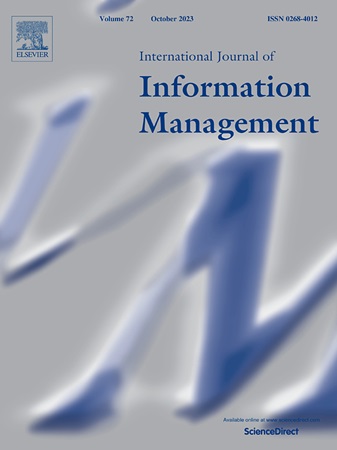Strategic adoption of generative AI in organizations: A game-theoretic and network-based approach
IF 27
1区 管理学
Q1 INFORMATION SCIENCE & LIBRARY SCIENCE
International Journal of Information Management
Pub Date : 2025-05-29
DOI:10.1016/j.ijinfomgt.2025.102932
引用次数: 0
Abstract
The rapid advancement of Generative AI (GenAI) has introduced new opportunities and challenges for organizations seeking to integrate AI-driven decision-making into hierarchical structures. This study presents a game-theoretic framework combined with a hybrid organizational network model to examine the dynamics of GenAI adoption. The network consists of managers, employees, and AI systems interacting within a structure that combines hierarchical reporting and scale-free collaboration. By simulating multiple organizational scenarios with varying adoption costs, managerial influence, and network rewiring mechanisms, we analyze how AI adoption propagates through departments, impacts interdepartmental collaboration, and influences organizational inequality. Our findings suggest that managerial optimism and the ability of organizational networks to adapt flexibly accelerate AI adoption. On the other hand, decentralized decision-making enhances collaboration but may lead to short-term inefficiencies. Furthermore, although adopting AI initially leads to increased inequality within the organization, this disparity tends to stabilize over time. Therefore, effective governance strategies are critical in balancing organizational efficiency with fairness. This research provides actionable insights for managers and policymakers to navigate AI integration effectively and optimize its long-term benefits.
组织中生成式人工智能的战略采用:博弈论和基于网络的方法
生成式人工智能(GenAI)的快速发展为寻求将人工智能驱动的决策整合到分层结构中的组织带来了新的机遇和挑战。本研究提出了一个结合混合组织网络模型的博弈论框架来研究GenAI采用的动态。该网络由管理人员、员工和人工智能系统组成,在一个结合了分层报告和无标度协作的结构中相互作用。通过模拟具有不同采用成本、管理影响和网络重新布线机制的多种组织场景,我们分析了人工智能的采用如何在部门间传播、影响部门间协作以及影响组织不平等。我们的研究结果表明,管理层的乐观态度和组织网络灵活适应的能力加速了人工智能的采用。另一方面,分散决策加强了协作,但可能导致短期效率低下。此外,尽管采用人工智能最初会导致组织内部的不平等加剧,但这种不平等会随着时间的推移而趋于稳定。因此,有效的治理策略对于平衡组织效率和公平性至关重要。这项研究为管理者和政策制定者提供了可操作的见解,以有效地驾驭人工智能集成并优化其长期效益。
本文章由计算机程序翻译,如有差异,请以英文原文为准。
求助全文
约1分钟内获得全文
求助全文
来源期刊

International Journal of Information Management
INFORMATION SCIENCE & LIBRARY SCIENCE-
CiteScore
53.10
自引率
6.20%
发文量
111
审稿时长
24 days
期刊介绍:
The International Journal of Information Management (IJIM) is a distinguished, international, and peer-reviewed journal dedicated to providing its readers with top-notch analysis and discussions within the evolving field of information management. Key features of the journal include:
Comprehensive Coverage:
IJIM keeps readers informed with major papers, reports, and reviews.
Topical Relevance:
The journal remains current and relevant through Viewpoint articles and regular features like Research Notes, Case Studies, and a Reviews section, ensuring readers are updated on contemporary issues.
Focus on Quality:
IJIM prioritizes high-quality papers that address contemporary issues in information management.
 求助内容:
求助内容: 应助结果提醒方式:
应助结果提醒方式:


